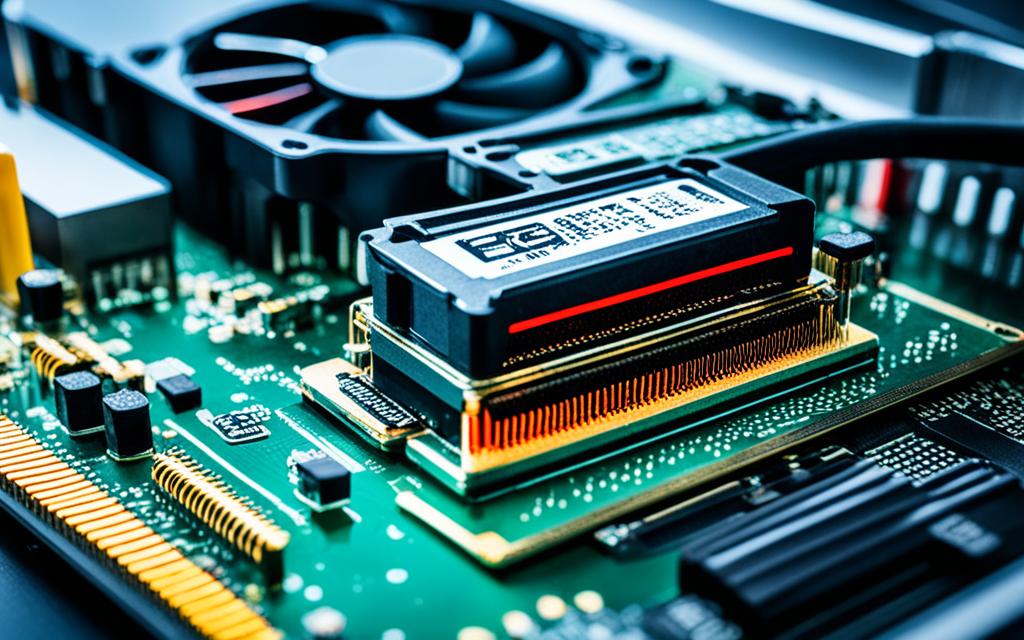Table of Contents
In today’s technology-driven world, knowing if your CPU is overclocked is key. Overclocking boosts a CPU’s speed beyond its normal limits, especially useful for gamers and tech enthusiasts. However, it comes with risks like overheating and possible damage12. Overclocking must be done with care, balancing speed with safety. This guide will show you how to spot an overclocked CPU, check it, and manage it safely to get the best performance.
Key Takeaways
- Overclocking significantly enhances processing speed but risks overheating.
- Specific CPUs, like Intel’s K or X series and AMD Ryzen, support overclocking.
- Effective cooling systems are crucial for safely fretting overclocked CPUs.
- Motherboards also play a vital role; select those with the right prefixes for stability.
- Regular monitoring and stress testing enhance the safety and effectiveness of overclock supercharging strategies benefit from regular checks and tests.
Understanding Overclocking and Its Implications
Overclocking lets users boost their CPU’s speed beyond what the maker set. It unlocks more computing power, changing how tasks are done. The overclocking definition is about raising clock speeds to improve performance, loved by gamers and tech fans.
What is Overclocking?
Overclocking means making a CPU run faster than its original speed, boosting performance. For example, an Intel i9-10900K usually runs at 3.7 GHz but can go near 6 GHz with good cooling. This makes processing faster for tough apps, bettering user experience.
Benefits and Risks of Overclocking
Overclocking brings big upsides. It can make games run better, multitasking smoother, and apps more responsive. By pushing the CPU’s power up, games can look smoother with higher frames per second3. But, overclocking’s risks are serious. It can make the CPU hotter, usually between 104 and 176°F (40 to 80°C)3. Too much heat can make the system less reliable and shorten component life2. It’s key to have strong cooling, like 30-40% more than the base clock setup4, and good airflow with at least two fans for both intake and exhaust4.
Why Users Overclock Their CPUs
Many turn to overclocking to boost their computer’s speed without spending more. Computer lovers look for ways to make old hardware faster, often considering overclocking. It can enhance performance but might cancel warranties, so knowing the terms is important3. Also, not every computer can be overclocked as it needs certain hardware2. So, it’s crucial to understand overclocking’s benefits and take the right precautions for success.
Signs That Your CPU Might Be Overclocked
To find out if your CPU is overclocked, look at its performance and temperature. By checking these areas, you can understand how your CPU is doing. You’ll also see if overclocking has affected it.
Performance Benchmarks and Comparisons
Performance tests give a clear view of your CPU’s condition. Cinebench and Geekbench are key for this. If your score is way above what’s expected, your CPU’s speed might have been increased5. Normally, CPUs perform within a set range. But overclocked CPUs do much better, even hitting speeds near 6 GHz6.
It’s important to regularly compare your results to the average. This is especially true for PC gamers and those who want better performance. These checks reveal any major changes.
Temperature Variations
Keep an eye on your CPU temperature, too. Overclocking makes it run hotter. So, tracking temperature is key to keeping it working well7. If it goes over 80°C when busy, it might be overclocked6.
Use software to monitor this. It will help you spot if it’s getting too hot. This step is crucial for those who want to push their systems further without causing damage.
How to Know If Your CPU is Overclocked
Figuring out if your CPU is pushed past its standard specs is key for great performance. There are various ways to check the speed of your CPU. This will help you know if it’s overclocked. Knowing how to do this can help you understand your CPU better.
Using Task Manager for Quick Checks
To check your CPU clock speed easily, open Task Manager with CTRL+ALT+DEL. Go to the Performance tab to see your CPU’s speed. If the speed is higher than what the manufacturer says, your CPU may be overclocked. Task Manager is good for quick checks to avoid future problems.
Utilising CPU-Z for Detailed Insights
For deeper details about your CPU, consider using CPU-Z. This tool tells you everything from core speed to multiplier settings. If these numbers are higher than normal, your CPU is likely overclocked. CPU-Z is perfect for those who want to get the most from their PCs.
Checking BIOS Settings for Clock Frequencies
If you’re okay with tech, check your CPU’s settings in the BIOS. After your computer starts, press the DEL or F2 key to get into the BIOS. Here, you can see if the clock speed and multiplier are too high. This hints that your CPU is overclocked. Checking the BIOS is a great way to learn about your CPU’s condition.
Monitoring and Managing CPU Performance
After you overclock, monitoring your CPU performance is key. This makes sure your system stays stable and efficient. CPU stress tests with tools like Prime95 or AIDA64 are great for this. They show how your CPU copes under heavy loads, such as big games or demanding apps.
Stress Testing Your CPU
It’s crucial to run a CPU stress test on your overclocked CPU. This tells you if your settings are good for the long term. Aim to test for at least 30 minutes. This way, you’ll see if your CPU can handle the load. You’ll find out if your cooling is strong enough to keep things stable and prevent overheating. Good cooling is vital when you overclock, as it leads to more heat.
Adjusting Overclocking Settings Safely
If you find problems during testing, adjust your overclock settings slowly. Lowering clock speeds or improving cooling can help keep things stable. It’s important to watch your CPU’s temperature with resources like this guide. Too much heat can really cut down how long your CPU lasts, maybe even by half.
Managing your overclock well means you get better performance without hurting your CPU’s life. Since every system is different, sharing tips and advice with others can be very helpful8.
Conclusion
Understanding how to check if your CPU goes beyond its factory settings is key. It can really boost performance and the life of your device. For example, the AMD FX-8120 rose from 3.1 GHz to 8.3 GHz, which is over 250% better than its original speed9. Yet, we must think carefully about the heat and how long parts will last.
Using tools like HWMonitor or Core Temp is smart. They help you keep an eye on your CPU’s heat10. It’s critical to do regular tests to make sure everything is stable. This helps avoid issues like electromigration and parts wearing out too soon9. If we’re careful, we can really make the most of our CPUs without causing harm.
In the end, keeping track of CPU performance can make your computing better. Overclocking is great for those who want to improve their systems. With enough know-how and the right tools, overclocking is a thrilling chance. It lets tech lovers enhance their setups while keeping a good balance between power and lastingness.
FAQ
What is overclocking, and how does it enhance CPU performance?
Overclocking means making your CPU run faster than the usual setting. This process boosts performance, useful for gaming or rendering. It speeds up the tasks considerably.
What are the primary risks associated with overclocking?
Overclocking can lead to overheating and might shorten your device’s life. It can also result in data loss. Hence, it must be done with care to avoid damaging your system.
How can I monitor the temperature of my CPU during overclocking?
You can keep an eye on your CPU’s temperature with apps like Core Temp or HWMonitor. These apps show temperature in real-time, helping keep your CPU safe.
What tools can I use to benchmark my distCPUinctinct CPU performance?
For benchmarking, Cinebench and Geekbench are top choices. They give you scores to show if your CPU’s performance has improved with overclocking.
What is the significance of cooling solutions in overclocking?
Good cooling is key when overclocking because it helps with the extra heat. This ensures your computer runs smoothly and lasts longer, even at higher speeds.
How can I safely adjust my CPU’s overclocking settings?
Start by making small changes to overclocking settings. Then test for stability. If you face issues, decrease the overclock or improve cooling to keep everything running well.
Are there specific benchmarks that demonstrate overclocking success?
Yes, if your benchmark scores are much higher than usual, it shows overclocking success. Always, check online for what scores you should expect.
How long should I stress test my CPU after overclocking?
You should stress test for at least half an hour. Doing this ensures that your overclocking settings are stable and won’t cause issues during heavy use.
Can I check my CPU’s status without using external software?
Indeed, you can use Windows Task Manager to see your CPU speed. If speeds are above the base or turbo levels, your CPU is likely overclocked.
Source Links
- https://www.digitaltrends.com/computing/how-to-overclock-your-cpu/ – How to overclock CPU safely with XTU, Ryzen Master, or BIOS | Digital Trends
- https://www.businessinsider.com/guides/tech/what-is-overclocking – What is overclocking? How to boost your PC’s speed and power by changing its CPU settings
- https://www.crucial.com/articles/about-memory/what-is-overclocking – What is Overclocking? Examining Pros and Cons
- https://forums.tomshardware.com/faq/cpu-overclocking-guide-and-tutorial-for-beginners.3347428/ – CPU overclocking guide and tutorial for beginners
- https://www.malwarebytes.com/cybersecurity/computer/what-is-overclocking – What is Overclocking? | Malwarebytes
- https://www.makeuseof.com/ways-to-check-if-cpu-gpu-overclocked/ – 3 Ways to Check If Your CPU or GPU Is Overclocked
- https://www.avast.com/c-how-to-overclock-cpu – How to Safely Overclock Your CPU for PCs & Laptops
- https://www.tomshardware.com/how-to/how-to-overclock-a-cpu – How to Overclock Your CPU: Get the Most GHz from Your Processor
- https://www.tomshardware.com/reviews/cpu-overclocking-guide,4593.html – CPU Overclocking Guide: How (and Why) to Tweak Your Processor
- https://softwareg.com.au/blogs/computer-hardware/how-to-know-if-i-can-overclock-my-cpu – How To Know If I Can Overclock My CPU








